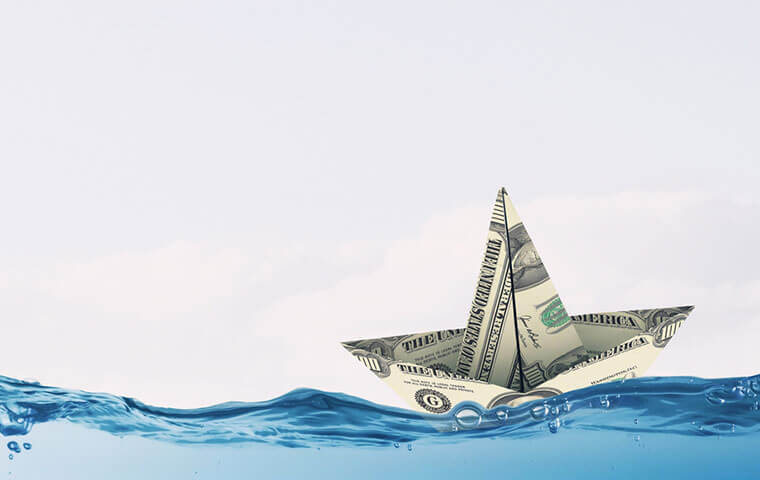Continue saving like a pessimist, investing like an optimist, and being kind to each other. Image: Sergey Nivens/Shutterstock.com
Whether you’re early-career, approaching retirement, or already crossed the finish line, you need to understand that the sky is falling….and always has been falling…and will continue to fall. Despite what you see on the 24/7 news cycle or social media, investing decisions based on political changes or your emotions are the quickest way to sink your financial ship.
Bạn đang xem: Why This is Not the Time to Change Your Investment Strategy
Time to Panic
I belong to a handful of Facebook groups that are centered around life as a federal employee, personal finance, and retirement planning. These groups are an amazing resource, filled with generous people who share their opinions, experiences, and knowledge on money, employee benefits, and life.
Since November 5th, there has been a noticeable change in the theme of some posts and comments.
Our country just endured another emotionally charged presidential campaign season. The results are in, and some people are elated while others are in despair. In the world of Facebook, many people say exactly what they’re thinking and some tend to be harsher than they would be if face-to-face with another human. The divisive tone of some members in these groups is nothing new. Our community will always have those people. What really troubles me about the recent shift are the impulsive financial decisions being contemplated.
“What’s everyone doing with their investments now that XYZ policy is going to be implemented?”
“Should we be moving money to XYZ fund since the new administration promised to [insert proposal]?”
“What benefits will I get if I quit before being eligible for retirement? What if I’m fired before resigning?”
These are not inherently bad questions to ask. You should know about immediate vs. deferred retirement if you’re contemplating resignation. You should have a plan for a worst-case scenario where you’re laid-off. However, these decisions should not be made impulsively – or strictly as a result of who occupies 1600 Pennsylvania Avenue.
Here’s why.
Elections and the Stock Market
“If he/she gets elected, we’ll surely have a prolonged recession!” I’ve seen this “guarantee” from talking heads and novice social media soothsayers regarding both President-Elect Trump and Vice President Harris. These are the same people who have been predicting economic doomsday year-after-year for a decade through every presidential election season…and we’ve seen how accurate that was. The fact is, nobody truly knows what lies ahead for our country or the stock market.
There is no historical correlation between a presidential election and stock market returns.
According to data compiled by First Trust, since 1928, there have been 24 presidential elections. In the years where an election was held, 20 (83%) saw the S&P 500 finish positive. When a Democrat occupied the White House and a Democrat was re-elected, the average S&P 500 return was 15%. When control changed from a Democrat to Republican, the average return was almost 13%. The last time we saw a negative return combined with an election year was in 2008, when the S&P 500 fell over 38% as the nation was plunged into the Global Financial Crisis. I believe most academics would agree that this was brewing long before the 2008 election and would have occurred either way, election or no election.
This Time is Different
What if this time is different? What if something bad happens that we haven’t experienced before? I’ve got some bad news. This time is different, because nobody has lived through 2025 yet, and the crystal balls are broken. Eventually, bad things are going to happen. When and in what way? Who knows. These black swan events will make it seem impossible for the country, let alone the stock market, to recover.
And yet, history shows us that’s exactly what we’ve always done.
Despite 9/11, the War on Terror, the Great Recession, World War I, World War II, the dot com bubble, decades in Afghanistan, the Iraq War, a presidential assassination, the Vietnam War, the Great Depression, Black Monday, Watergate, a global pandemic, the Gulf War, the U.S. credit downgrade, the end of the gold standard, trade wars, inflation, stagflation, deflation, multiple presidential impeachments, the Korean War, missiles in Cuba, and a growing national debt, the United States – and the stock market – has continued marching on. None of these destroyed our country.
Even with all of these events, over the long-run, the U.S. Stock Market has been resilient. People, and the companies they build, have continued to innovate and adapt.
According to New York University Stern School of Business Professor Aswath Damodaran, the S&P 500 (including dividends) has produced an average inflation-adjusted annual return of:
8.40% (1928 – 2023)
8.42% (1974-2023)
9.98% (9.98%)
Xem thêm : Marrying tech to advisor minds: Show Me Your Stack
Are we guaranteed to see these returns in the future? Again, who knows. However, I am of the mindset that we should invest like optimists and save like pessimists. When I say save like a pessimist, I mean have an adequate emergency fund and put some of your savings towards appropriate insurance coverage. If I invested like a pessimist, I never would have started. There’s always going to be a reason to be fearful and sit on the sidelines.
“I’ll Just Stay Uninvested Until Things Calm Down.”
Staying out of the market, “until things calm down”, is the equivalent of running into your old high school classmate and saying, “Let’s catch-up sometime”. Or saying, “I’ll take that trip I’ve been putting off once life slows down.” Let’s be honest, life doesn’t slow down and you rarely catch-up with that old friend.
The #1 asset you have is time.
Making emotional decisions to buy and sell out of the market is a losing strategy that will cost you. Constantly reallocating your TSP or IRAs based on the current political climate may seem like a smart move, but it’s simply playing a losing game.
Let’s use an example with a lot of negative news. We’ll pretend it’s January 2020. You’re glued to the news and fear this new coronavirus thing might affect your investments. You decide to sell all of your U.S. stocks and move to cash, successfully avoiding losses of -0.5% in January, -8.7% in February, and -13.1% in March. And then you wait. When do you put your money back in the market? The CDC is talking about scenarios involving unthinkable worldwide death. The federal government is shutting down. Military mobile hospitals are being built. Local and state government are mandating that we stay at home. China and the global supply chain have ground to a halt.
You decide you’re going to wait it out and put your money back in once this thing settles down and we get the “all clear”. You stay uninvested, holding cash for the rest of 2020. How’d you do by the end of the year? You missed out on 18% growth. Can any of us accurately predict when the market has peaked and accurately predict when it’s reached the bottom and will rebound? To think we have the skill and/or luck to accurately predict both of these is an illusion.
Best Days & Worst Days
The best days in the stock market tend to hang out with the worst days. This might sound farfetched and illogical, but the data doesn’t lie. Let’s take 1992-2021. Let’s say you invested $10,000 and never sold. By 2021, that $10K grew to $208,215. What if instead you got nervous during the tech bubble or the 2016 election and moved to cash every so often, missing just 20 of the best days over 20-years. Missing only 20 of the best days reduced your ending balance by 73%, leaving you with $56,301. That’s a $151,914 error based on emotion. Staying out of the market and missing a handful of days can erode your long-term success, and requires a lot of mental bandwidth in the meantime. The greed – fear – regret cycle can be exhausting.
Retired or Nearing Retirement
Much of this article seems to have been geared towards those still working and investing. However, the evergreen advice to ignore the noise, stay invested, and avoid market timing applies to retirees as well. Just in a slightly different way.
When I see someone nearing or in retirement start to question if they should reduce their stock holdings and move to safer assets in light of current events, it tells me that one of, or a combination of these four factors are happening:
(1) Their asset allocation (stock/bond/cash mix) is not a good fit for them
(2) They don’t have a true understanding of their asset allocation
(3) They are experiencing their first round of market turmoil since entering the decumulation stage (as opposed to accumulation stage which occurs while working and building the nest egg)
(4) They lack a clear retirement income strategy
If a retiree is questioning their allocation towards stocks when the market seems uncertain, they may have an asset allocation that doesn’t truly align with their personal risk profile. The key word here is personal. Do not take advice from strangers on Facebook regarding how much C Fund or G Fund you should have. They can’t begin to understand your household finances, health status, family situation, goals, tax intricacies, legacy intentions, or the myriad of other factors that should be taken into account.
Your risk profile is not just your risk tolerance, the “sleep at night factor”. It’s also a question of risk capacity. How much capacity does your portfolio have to weather market volatility without having to adjust your spending? For many federal employees, they have more capacity than tolerance due to their stable COLA-adjusted pensions, Social Security, and for some the Retiree Annuity Supplement. Some may even have post-retirement employment, rental properties, or business income.
Despite adequate and stable income sources, some people simply don’t want to deal with stock market volatility. This is okay to a certain extent; however, don’t forget that one of the biggest risks we face is not market volatility. Volatility is when prices go up and down, which is to be expected. Risk on the other hand is when something truly goes down and loses value. While volatility may feel painful at the time, the true long-term enemy is inflation. You need some of your dollars fighting the inflation battle, and if we’re using historical numbers, that means you need to have some money invested in stocks.
For those who think 100% cash or 100% bonds is the “safest” route to go – I’ll refer you back to NYU Professor Aswath Damodaran.
3-Month U.S. Treasury Bills produced the following average inflation adjusted returns:
0.32% (1928-2023)
0.46% (1974-2023)
-1.43% (2014-2023)
Xem thêm : Edward Jones, Osaic, Cambridge hit with $8.2M in restitution
10-Year Treasury Bonds produced the following average inflation adjusted returns:
1.86% (1928-2023)
2.73% (1974-2023)
-0.78% (2014-2023)
Are these returns enough to keep your portfolio growing and provide the income you need for your entire retirement? I am by no means suggesting that you don’t own bonds. Bonds can provide income, diversification, and stability in your portfolio. A proper asset allocation for retirees generally includes a portion of bonds at some point.
For retirees or near-retirees feeling panicked, I recommend evaluating: (1) your cash cushion, (2) how much of your portfolio you have exposed to stocks, and (3) your distribution/income plan. There’s always the popular “bucket strategy”, where you keep a cash/money market “bucket” to cover spending for multiple years so that during a prolonged market downturn, you’re not forced to sell stocks at a loss in order to support spending needs. This bucket-type account structuring may help you mentally match certain assets with liabilities and be less emotional during volatile times.
Zoom Out & Take a Breath
I’m am not discounting the fear that some federal employees are experiencing.
I’m a federal employee just like you. There’s a new administration coming to the White House. There will undoubtedly be change. I have no idea what’s actually going to happen, and anybody that says they know exactly what life is going to look like as a federal employee next year is flat out wrong.
This is the price of admission for living in a democracy, where presidents change and political power shifts. For those in despair, please zoom out and remember that there are worse things than what you’re imagining. The world is filled with governments that never change administrations, or only change administrations via gunfire. As Churchill said, “Democracy is the worst form of government, except for all the others.”
Your career, personal finance, and investment decisions should not be based on political winds, a change of administration, hope, despair, greed, fear, or any emotion for that matter. Instead, we should be making decisions based on reasonable facts known at the time, our values, and personal financial goals. I’m not trying to convince you to do, or not do anything with your career or investments. I would simply ask that you don’t make these decisions lightly, impulsively, or based on emotion.
Continue saving like a pessimist, investing like an optimist, and being kind to each other.
Tyler Weerden, CFE is a financial planner and the owner of Layered Financial, a Registered Investment Advisory firm. In addition to being a financial planner, Tyler is a full-time federal agent with 15 years of law enforcement experience on the local, state, and federal level. He has served in both domestic and overseas Foreign Service assignments. Tyler has experience with local, state, and federal pension systems, 457(b) Deferred Compensation, the federal Thrift Savings Plan (TSP), Individual Retirement Arrangements (IRAs), Health Savings Accounts (HSAs), and invests in rental real estate. He holds a Bachelor of Science degree, a Master of Science degree, passed the Series 65 exam, and is a Certified Fraud Examiner (CFE).
Schedule F and DOGE: A Federal Employment Attorney’s Analysis
Crucial Last Checks before Retiring
How to Never Run Out of Money in Retirement
FERS and Social Security are Big, but You’ll Want a Fat TSP
There Could be More TSP Millionaires but for These Two Things
Best States to Retire for Federal Retirees: 2024
Is 2025 the Year to Open an HSA?
Enrollee Share of FEHB Premiums to Jump 13.5 Percent on Average for 2025
FERS Supplement vs The 10% Pension Bonus
2024 Federal Employees Handbook
Nguồn: https://horizontalline.icu
Danh mục: News







